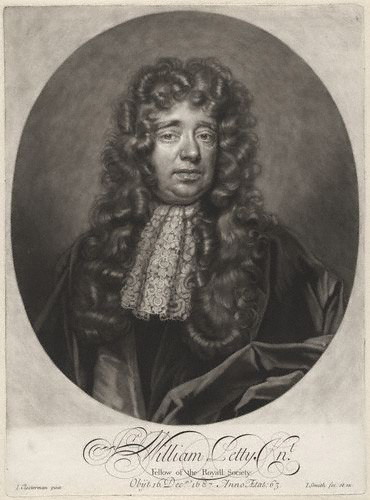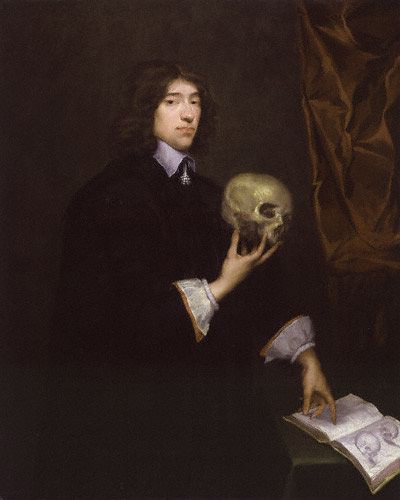<Back to Index>
- Political Philosopher William Petty, 1623
- Novelist Enoch Arnold Bennett, 1867
- King of Bavaria Maximilian I Joseph, 1756
PAGE SPONSOR


Sir William Petty (27 May 1623 – 16 December 1687) was an English economist, scientist and philosopher. He first became prominent serving Oliver Cromwell and Commonwealth in Ireland. He developed efficient methods to survey the land that was to be confiscated and given to Cromwell's soldiers. He also managed to remain prominent under King Charles II and King James II, as did many others who had served Cromwell.
He was Member of the Parliament of England briefly and was also a scientist, inventor, and entrepreneur, and was a charter member of the Royal Society. It is for his theories on economics and his methods of political arithmetic that he is best remembered, however, and he is attributed as having started the philosophy of 'laissez-faire' in relation to government activity. He was knighted in 1661. He was the great-grandfather of the future Prime Minister, William Petty Fitzmaurice, 2nd Earl of Shelburne and 1st Marquess of Landsdowne. Petty was a founder member of The Royal Society. He was born and buried in Romsey and was a contemporary and friend of Samuel Pepys. In 1858, Henry Petty-Fitzmaurice, 3rd Marquess of Lansdowne, one of Petty's descendants erected a memorial and likeness of Petty in Romsey Abbey. The text on it reads: "a
true patriot and a sound philosopher who, by his powerful intellect,
his scientific works and indefatigable industry, became a benefactor to
his family and an ornament to his country". His grave slab on the floor of the south choir aisle reads HERE LAYES SIR WILLIAM PETY. Petty's
father and grandfather were clothiers. He was a precocious and
intelligent youngster, and became a cabin boy in 1637, but was set ashore in Normandy after breaking his leg on board. After this setback, he applied in Latin to study with the Jesuits in Caen, supporting himself by teaching English. After a year, he returned to England and had by now a thorough knowledge of Latin, Greek, French, mathematics and astronomy. After an uneventful period in the Navy, he left to study in Holland in 1643, where he developed an interest in anatomy. Through an English professor in Amsterdam, he became the personal secretary to Hobbes allowing him contact with Descartes, Gassendi and Mersenne. In 1646, he returned to England and, after developing a double-writing instrument with little success in sales, he studied medicine at Oxford University. He befriended Hartlib and Boyle, and he became a member of the London Philosophical Society, and possibly met John Milton. By 1651, he had risen to Professor of Anatomy at Brasenose College, Oxford, and was also Professor of Music in London. In 1652, he left on a leave of absence and traveled with Oliver Cromwell's army in Ireland, as physician-general. His opposition to conventional universities, being committed to ‘new science’ as inspired by Francis Bacon and
imparted by his afore-mentioned acquaintances, perhaps pushed him from
Oxford. He was pulled to Ireland perhaps by sense of ambition and
desire for wealth and power. His breadth of interests was such that he
successfully secured the contract for charting Ireland in 1654, so that
those who had lent funds to Cromwell's army might be repaid in land - a
means of ensuring the army was self-financing. This enormous task he
completed in 1656 and became known as the Down Survey, later published (1685) as Hiberniae Delineatio. As his reward, he acquired approximately 30 000 acres (120 km²) in Kenmare, in southwest Ireland, and £9 000. This enormous personal advantage to Petty led to persistent court cases on charges of bribery and breach of trust until his death. None were ever proven. Now back in England, as a Cromwellian supporter, he ran unsuccessfully for Parliament in 1659 for West Looe. Despite his political allegiances, he was well-treated at the Restoration, although he lost some of his Irish lands. In 1662, he was invited to join the 'Invisible College', a club of intellectuals and was a charter member of the Royal Society of the same year. This year also saw him write his first work on economics, his Treatise of Taxes and Contributions.
Petty counted among his many scientific interests naval architecture:
he had become convinced of the superiority of double-hulled boats,
although they were not always successful; the Experiment reached Porto on 1664, but sank on the way back. He was knighted in 1661 by Charles II and returned to Ireland in 1666, where he remained for most of the next twenty years. The
events that took him from Oxford to Ireland marked a shift from
medicine and the physical sciences to the social sciences, and Petty
lost all his Oxford offices. The social sciences became the area that
he studied for the rest of his life. His primary interest became
Ireland’s prosperity and his works describe that country and propose
many remedies for its then backward condition. He helped found the Dublin Society in 1682. Returning ultimately to London in 1685, he died in 1687. He
regarded his life in bittersweet terms. He had risen from humble
origins to mix with the intellectual elite and was by 35 a considerably
wealthy man and leading member of the 'progressive sciences'.
Nonetheless, he was insecure about his land holdings and his ambitions
of obtaining important political posts remained frustrated. Perhaps he
expected the astronomical rise he experienced in his early years to
continue throughout his life. Contemporaries described him,
nonetheless, as humorous, good-natured and rational. He is most well known for economic history and statistic writings, pre-Adam Smith. Of particular interest were Petty's forays into statistical analysis. Petty's work in political arithmetic, along with the work of John Graunt, laid the foundation for modern census techniques. Moreover, this work in statistical analysis, when further expanded by writers like Josiah Child, documented some of the first expositions of modern insurance. Vernon Louis Parrington notes him as an early expositor of the labor theory of value as discussed in Treatise of Taxes in 1692. It is important to point out two crucial influences in his life. The first is Thomas Hobbes,
for whom Petty acted as personal secretary. According to Hobbes, theory
should set out the rational requirements for ‘civil peace and material
plenty’. As Hobbes had centered on peace, Petty chose prosperity. Secondly, the influence of Francis Bacon was
profound. Bacon, and indeed Hobbes, held the conviction that
mathematics and the senses must be the basis of all rational sciences.
This passion for accuracy led Petty to famously declare that his form
of science would only use measurable phenomena and would seek
quantitative precision, rather than rely on comparatives or
superlatives, yielding a new subject that he named political arithmetic. Petty thus carved a niche for himself as the first dedicated economic scientist, amidst the merchant pamphleteers, such as Thomas Mun or Josiah Child, and philosopher scientists occasionally discussing economics, such as Locke. He was indeed writing before the true development of political economy. As such, many of his claims for precision are of imperfect quality. Nonetheless, Petty wrote three main works on economics, Treatise of Taxes and Contributions (written in 1662), Verbum Sapienti (1665) and Quantulumcunque concerning money (1682),
all refreshingly concise. These works, which received great attention
in the 1690s, show his theories on major areas of what would later
become economics. His most important theories were those on
fiscal contributions, national wealth, the money supply and circulation
velocity, value, the interest rate, international trade and government
investment.